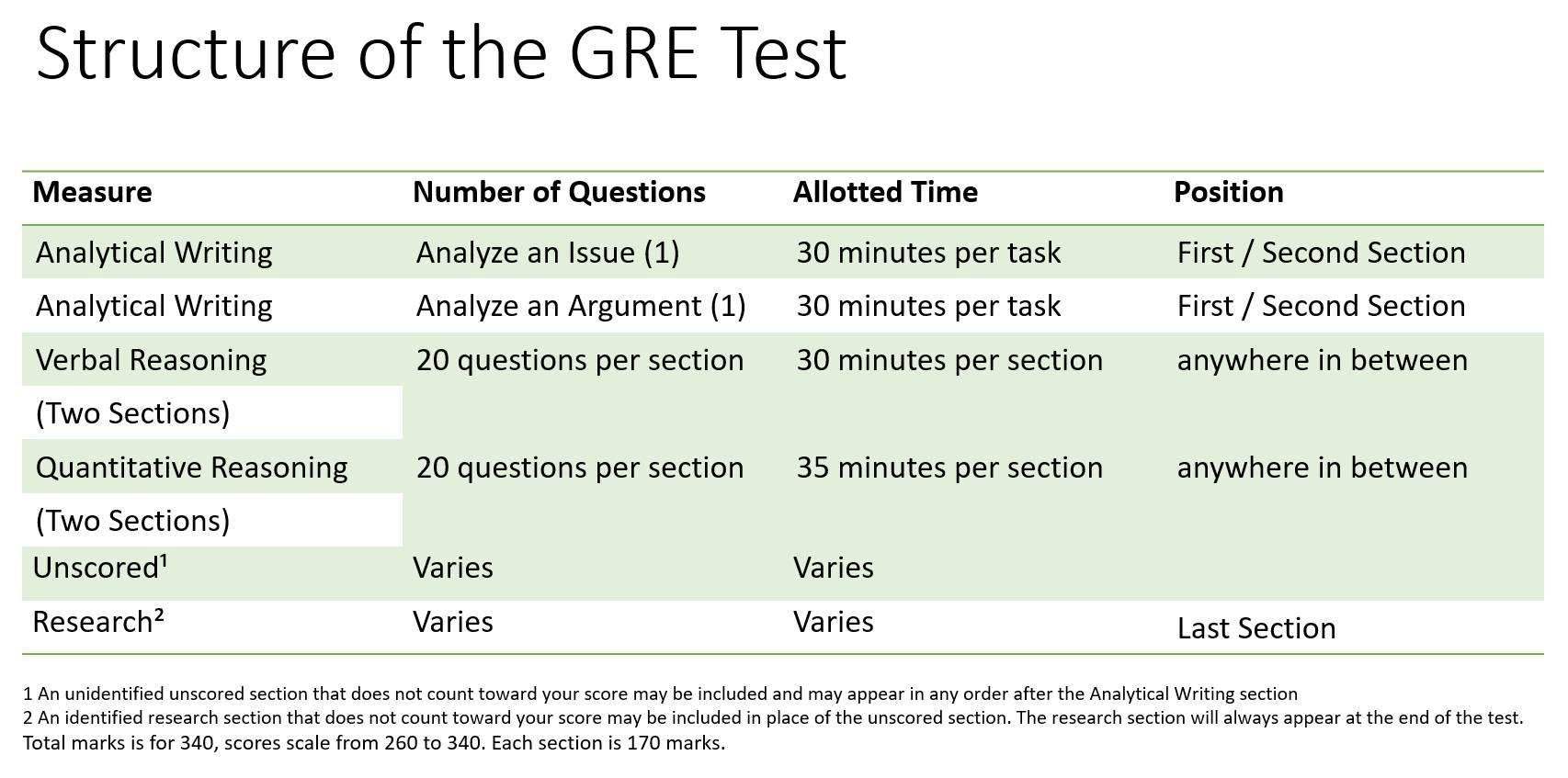The GRE Examination is an International standardized examination, which is required for admission to graduate schools in the United States/Canada and also some European, Asian, and Australian Universities. The GRE exam is conducted and administered by Education Testing Services (ETS). GRE is conducted throughout the year and is mostly administered in most countries as an online examination. A candidate can take the exam a maximum of five times in a period of 12 months, the test is attended by candidates from all over the world. There are two types of GRE Examination, the GRE General Examination, and GRE Subject Tests. We will discuss both the tests in this article. Also, in this article, we will discuss the GRE exam qualification, application, syllabus, pattern, result, etc. to help you understand this examination better.
GRE exam is the first step towards their goals especially if they are looking for Master of Science (MS), Masters in Management (MIM), Master of Engineering Management (MEM), Master of Science in Engineering Management (MSEM), Master in Information System Management (MIS) or the Master of Project Management (MPM). Around 6 lakh students from all over the world appear for this exam. Graduate Record Examination or GRE is conducted mainly for admission to the post-graduation program and it is considered to be the world’s largest entrance examination among the internationally accepted examinations. GRE Score is considered to be one of the admission criteria by most of the prestigious universities and for a student who aspires to get into these top universities GRE Examination score is a mandatory requirement. GRE is recognized by more than 1000 institutes world-wide, including some universities in India like the IIMs and the IITs for their Ph.D. and Fellow Program in Management (FPM).
GRE examination is conducted in two types i.e. GRE General Test & GRE Subject Test.
This exam is conducted in two ways. The first way is the written and the second is the computer i.e. an online exam. In centers where there is no computer access, a written test is conducted. The time duration of this test is 3 hours 45 minutes and there are six sections in the examination. There are no negative marks in the section, but the sections of the examinations are adaptable across the section. It is a computer-based test and not a computer adaptable test within each section. The structure of the computer-based test is as follows.

GRE Examination is scored out of 340. The scores scale from 260-340 with each section maximum score being 170 marks. The Analytical Writing Section is scored separately out of 6, in increments of 0.5 marks. An average score in GRE would be around 310 and the student would be able to see the score of the Verbal Reasoning and Quantitative Reasoning section right after the examination, but the final scorecard with the analytical writing scores will be available only within 21 days of writing the examination. The GRE score is valid for 5 years.
There are three ways to get yourself registered for this exam:

The GRE General Test fees amount to USD $205, while the fee for the subject test is USD $150. In addition, in the case of late registration, there will be an additional charge of USD $25. At the time of registration, a candidate has to select a preferred date from the slots available and schedule their exam. The candidates can request a change of slot later for a fee of USD $50 and reschedule the examination to another available slot.
To give this test in India, you have to prove your identity, and for this purpose, you must have a valid passport. Apart from this, you cannot use any other document like date of birth, driving license, etc. as an identity. A candidate should be of a minimum 18 of age and there is no upper age limit for writing the GRE test but the university for which a candidate is applying may have their age restrictions or other conditions.
There is no fixed date for giving the GRE Examination, you can give this exam at any time of the year. Most of the students write the examination in India during the months of July through December as the application forms in most colleges open during the months of September to January. If a student is planning to write the GRE during this time, then he needs to plan his dates well in advance.
Analytical Writing: In this section, a candidate’s ability to evaluate complex ideas and support those with relevant arguments and evidence and how well he comes up with a logical discussion in support of his arguments are assessed. It also tests how good is written communication, which means there is an emphasis on grammar, vocabulary, and sentence formations.
Verbal Reasoning: This section assesses the candidate’s ability to analyze and draw interpretations and inferences from the given passages and recognize the author’s presumptions and notions. This section also includes vocabulary, usage, and contextual vocabulary questions.
Quantitative Reasoning: This section assesses the candidate’s ability to understand the information presented in the quantitative form and elucidate quantitative facts and data and find solutions to the given mathematical problems using mathematical formulas and application of basic mathematical conception and skilfulness. There are primarily four types of questions in this section viz. Multiple Choice Questions, Quantitative Comparison Questions, Fill in the Blanks Questions and Data Interpretation Question.
Following is the list of topics that come under the section of Quantitative reasoning: Ratio and Proportion, Simple and Compound interest, Profit and Loss, Speed, Distance and Time, Quadratic Equations, Statistics, Linear Equations, Probability, Sets Theory, Powers and Roots, Triangles, Quadrilaterals, Polygon, Coordinate geometry, Circles, Order of operations, Number properties, Percentage, Pipe & cisterns, work & time, Lines and Angles, Volume & surface area, Permutation & Combination
Following subjects are included in the syllabus of GRE Subject test
Biology
The test comprises of 190 five-choice questions of Biology & following are the topics
Chemistry
The test comprises of 130 multiple choice questions and is associated with the four fields of chemistry that are divided into the following topics
Literature in English
The test of literature covers areas from poetry and plays, history of language and literature, essays and biographies, novels and short stories, literacy theories, and questions of criticisms, so the following are the topics that a test taker should cover to prepare for the literature part.
Physics
The test comprises 100 five-choice questions and some of them are presented as a diagram, graphs, and experimental data and description of physical situations.
Mathematics
This test evaluates your mathematical knowledge of how much are you able to solve arithmetic, algebra, geometry, geometric, and statistics questions. The test comprises of 66 multiple – choice questions from the topics of mathematics that is commonly taught at the undergraduate level such as
Psychology
The test comprises 205 multiple-choice questions. There will be given five choices as the answer and the test taker has to choose the most suitable option. The following topics should be referred to for the preparation of Psychology.
